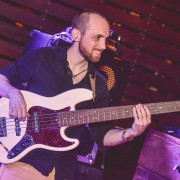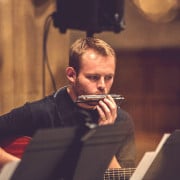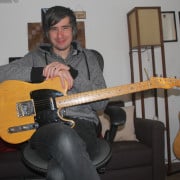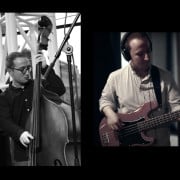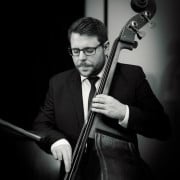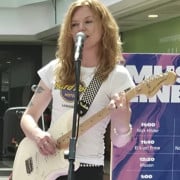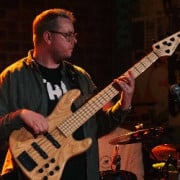Bass guitar teachers in Durham
-
-
Huw R
London (SW17***), Online
Bass Guitar, Guitar, Songwriting, Music Theory
-
Philip D
Bath (BA1***), Online
Bass Guitar, Guitar, Piano, Music Production
-
-
-
James B.
Leeds (LS10***), Online
Bass Guitar, Double Bass, Music Theory, Improvisation
-
Iain McK.
Penicuik (EH26***), Online
Bass Guitar, Guitar, Acoustic Guitar, Electric Guitar
-
Stanley G. 5.0 (3)
Leeds (LS12***), Online
Bass Guitar, Guitar, Acoustic Guitar, Electric Guitar
-
-
-
-
-
-
Matthew 5.0 (1)
Chester (CH1***), Online
Bass Guitar, Guitar, Acoustic Guitar, Electric Guitar
-
Want more options?
Expand your search criteria or scroll down to see teachers who offer online tuition.
Online teachers in bass guitar
Location doesn't matter when you choose to learn online and you can start right away.

Bass Guitar Lessons in Durham
Do you want to learn bass guitar? Thinking of taking bass guitar lessons in Durham? With Music Tutors, you can learn to play like awesome bassists Flea and Victor Wooten with bass guitar lessons in Durham from a high-quality professional music tutor. Get in touch with one of our great bass guitar tutors and you could start seeing rapid progress today! It doesn’t matter if you’ve just picked up the instrument for the first time or already have playing experience, we can match you with a tutor who can give bass guitar lessons in Durham tailored to you! Get in touch today for 50% off the first of your bass guitar lessons in Durham!
Flexible Solutions at MusicTutors.co.uk!
At MusicTutors.co.uk we understand that life can get crazy. That's why our range of amazing tutors offer the option to give bass guitar lessons in Durham at your own house! Speak to one of our great bass guitar tutors today to organise bass guitar lessons at a time and place that works around your busy schedule. Try the first of your bass guitar lessons in Durham for half price!
Do I Need My Own Bass for Bass Guitar Lessons in Durham?
It's always a good idea to have your own bass guitar and amp so you can get practising between lessons. Your new bass guitar teacher will be able to advise you on what bass guitar to buy, and the best way to make sure bass guitar is the instrument for you and your bass guitar lessons in Durham! Have a read below of what our MusicTutors team has to say about taking bass guitar lessons, and for more information click here.
Professional Trusted Tutors for Your Bass Guitar Lessons in Durham
Finding safety-assured bass guitar lessons in Durham can be tricky. At MusicTutors, we are committed to bringing regulation into private music tuition. All of our tutors have been through a recruitment process to ensure the quality of musicianship as well as teaching ability. Additionally, all of our bass guitar tutors must hold the Enhanced DBS Certificate before they can teach with us, building a community of trust between students, teachers, and parents. You can rest easy knowing that your bass guitar lessons in Durham are as safe as they can be!
Looking for Lessons in Another Instrument?
We are very proud of our team of Durham tutors, offering not just bass guitar lessons but lessons in all other instruments too. Check out some of our other Durham music teachers:
- See our Durham guitar tutors here!
- See our Durham singing tutors here!
- See our Durham drum tutors here!
- See our Durham piano tutors here!
Not Sure About Bass Guitar Lessons in Durham?
We have great tutors offering bass guitar lessons all over the UK. Check out some of them here...
Our Customers Love MusicTutors
"This is just an amazing company and run by some pretty awesome people. Connecting students with amazing tutors and musicians and helping people connect through the love of music. Music Tutors will influence the future of music education."
5 out of 5
Daniele De Lissandri - Music Tutor at Musictutors.co.uk
FAQ
- How Do I Get Started?
Simply choose your favourite teacher and send them a direct message by pressing the blue button on the right hand side of their profile! Then you and your tutor can chat to arrange the date, time and location for your first lesson. - How Do I Pay?
Once you have agreed on the details of your first lesson, your tutor will create a booking on the site. Payment can then be made via the platform. This is as simple as buying anything else online. You have the option of buying one lesson or buying a flexible block of lessons where you can receive up to 10% off. - Why Do Prices Vary?
At MusicTutors.co.uk we let our tutors set their prices depending on their own experience, demand and location. With our advice, tutors choose an appropriate price from 8 set prices. A lower price is not necessarily a sign of a lower quality teacher. - Lesson Types
Musictutors.co.uk only currently offers 1:1 lessons , but keep an eye on the website as we are planning to expand to group, and online lessons. - Can I Borrow an Instrument?
We do not offer an instrument rental service. However, our tutors can often advise you on this - so don’t hesitate to ask your tutor for help finding the right rental service. - Lessons for All Levels
Our tutors offer lessons at all levels - from beginners to advanced players. If you have specific requests such as GCSE/ A-Level tutoring, or preparation for a University audition, let us know and we can help you find the right tutor! - Lessons for Children
All of our tutors are high-quality professionals, holding either a music degree or years of relevant experience. In addition, we require that all of our tutors hold the Enhanced DBS certificate. So we can promise that your child’s lesson with one of our tutors will be high quality and safe.
If you have any questions about age and teaching approaches, you can contact the teacher directly or get in touch with our office team about finding the right tutor for your child. - Lessons for Mature Students
Are you looking to rekindle your old love of music after a long hiatus? Or looking to finally start something you’ve wanted to do your whole life? Our tutors are well equipped with stimulating lesson content for mature students as well as children, and will do all they can to make you feel comfortable and to personalise the experience for you!
Playing the Bass
As you’ve become inspired to take bass guitar lessons in Durham, you may have seen people play the instrument in different ways. Traditionally, the bass guitar strings are plucked with two of your fingers. This method is taken from the bass guitar's older relative: the double bass. However, different methods of playing the instrument have developed since then too. You may have heard of 'slap bass', a technique that produces a deep percussive timbre which sounds amazing at high speeds. You might have also seen bassists using a pick, much like guitarists do. All three of these methods are valid ways of playing. However, it all depends on the genre! Typically, you wouldn't use a pick in jazz playing, or slap bass in pop, but who's to say you can't mix it up! You can explore this with your teacher in your bass guitar lessons in Durham.
Buying Your First Bass for Bass Guitar Lessons in Durham?
When you’re buying your first bass guitar for bass guitar lessons, there are a couple of things that you need to know. Firstly there’s getting the right size instrument! Bass guitars come in a few different sizes: for the younger beginner bassist, we would recommend getting a ½ size or ¾ sized Bass guitar. Either will be fine to get you started, so pick the size that feels most comfortable for you. For those picking up the instrument at a later stage, you should buy a full- size bass. Most basses that you see in a music shop will be a full-size so they are easy to spot. Ask about this in your bass guitar lessons.
There are two common types of bass guitars - acoustic and electric. It is most likely that you will play the electric bass, therefore you will also need an amplifier. It's worth going to your local music shop and seeing if they have a beginner pack which includes a bass guitar, amplifier, plectrums, and a jack lead (which connects the instrument to the amp.)
For an all-inclusive beginner kit, you will be looking at a price between £120- £200. For just a beginner bass guitar on its own, you should look in the region of £100-£200 although there are some options for under £100. Finally, for just the bass amp on its own, you’ll be looking in the region of £150- £300.
Different Types of Electric Bass
Presuming that you have decided to take bass guitar lessons in Durham with an electric bass, it is likely that you will come across the terms 'Precision Bass' and 'Jazz Bass'. These are the two most well-known types of bass guitar produced by Fender. However, other companies also produce instruments based on these designs, sometimes calling them P style, or J body - so it is good to know the differences between the two.
Precision Bass
The precision bass has a similar body style to the Fender Stratocaster guitar. This bass has been very popular with rock, pop, punk and indie players. Famous players include Sting, Pino Palladino, Nate Mendel, and Mark Hoppus.
Jazz Bass
The jazz bass has what we call an 'offset body'. This is more similar to the Fender Jazzmaster or Jaguar guitar. The shape was primarily designed for jazz players who performed sitting down. So it is worth trying this style of bass standing up, to check that it feels comfortable to you. It's also worth mentioning that the neck will feel a lot slimmer than the P bass.
Other Designs
Of course, these are not the only two styles of bass that you can pick up. However, they are the most common and have been super influential on other bass designs. Other designs include a Sting-Ray from Ernie Ball, as well as bass designs based on famous guitars, including the SG Bass by Epiphone, and the Jazzmaster Bass, also by Fender.

Strings on a Bass Guitar
Your bass guitar teacher will cover this for you in your bass guitar lessons, but here's a bit of starter information to get you ahead of the game! The four strings of a bass guitar are the same as the bottom four strings of a guitar: from low to high E-A-D-G. However, the bass guitar strings are an octave (12 semi-tones) lower, producing a thick deep sound. Also, bass strings are very thick - a lot thicker than Guitar strings. This does mean that they are more expensive to buy, with an average set of strings costing around £20-£25. With this in mind, it's worth taking good care of them so that you don’t need to replace them as often. You can simply wipe them down with a dust cloth, removing any dirt that has got caught between the neck and the strings. This will keep the strings sounding fresh and help them last longer.
It's also worth considering that the width of the strings makes them much more difficult to play than guitar, so it's likely you'll find it tough on your fingers in the beginning. Don’t be discouraged by this - everyone experiences this! Even your favourite virtuoso bass players will have had trouble to begin with. Instead of being afraid of this, accept the challenge! Play for a short amount of time each day - when your fingers start to hurt, take a break and come back to it. By playing for a short time each day, you'll soon build finger strength, and you won't find it tricky at all after a while! If you carry on with this positive mindset, you’ll find the learning process more enjoyable, plus you'll find you're making progress really quickly!
Finding Your Way Around the Fret Board
When we first pick up the bass it can seem daunting: in front of us are what seems like hundreds of frets and an endless stream of notes. But hopefully, we can give you some pointers to get you started. Let’s take the bottom E string. When we play it on its own with no fingers on the fretboard, we call that playing an “open” string. Once we’re ready to play “fretted notes” (notes that sound by putting our left-hand fingers on the fretboard), we need to know which fret is which. This will seem very difficult at first, but it is just a matter of counting.
Our “open” E string we number as Zero.
The first fret is 1.
From there, each fret is a new note that is one semi-tone away from the last.
Just try playing each of the frets, from the first fret going up by one each time so that your hand is moving closer to you.
Once you get to your 12th fret, you're back round to E. This principle also applies for the other three strings. Try practising getting familiar with this outside of your bass guitar lessons, to improve as quickly as possible!
Tuning Your Bass
Tuning is another obstacle that guitarists and bassists need to learn in the early stages. In fact, we recommend that it is one of the first things you learn. To get you started, you can purchase a tuner which will tell you if the bass notes are sharp or flat. An alternative way is to tune to a Piano. To do this you would play the E-A-D-and G notes on a Piano and then compare the two notes. Spend some time trying to match the open string notes to the piano notes, turning the pegs only a tiny bit each time. This will be harder at the beginning because we are training our ears and trying to understand new and abstract concepts. But mastering this will improve your musical ear from the start. Your teacher can help you with this in your first bass guitar lessons in Durham.
Knowing What to Play
Most bass parts consist of single notes. However, it is possible to play chords, but this technique is not common - the instrument already has a deep sound, so chords can sound too muddy and can be tricky to pair with other chordal instruments like guitar. However, chordal bass parts have been used in some great songs, and can sound really nice, especially in the bass' higher register. Play around with chords, single note parts and some different techniques - have a listen to the bass parts in your favourite songs, discover what you love to play, and take this to your bass guitar lessons!
Using a Metronome
Playing with good timing is important for any musician, but it's especially important for bassists! Sometimes, this is something people realise after playing for a couple of years, and they have to jump back to basics to work on this. It's best to work on this from the very beginning, that way it's ingrained in your playing for life!
We suggest buying a metronome! This is a device that clicks at an even pace, so each click can represent a beat in the bar. Start off with 4/4 - four beats in a bar. Let the metronome do the counting for you, and aim to play exactly on each click of the metronome. This is a difficult task, and not always the most exciting one, but don’t feel discouraged! Every musician has to learn to do this, and it's so worth the hard work! Having an excellent grasp on the fundamentals is what separates a good player from a great one.
Playing in a Band
Something you can't explore fully within your bass guitar lessons is playing with a whole band of other people - this is definitely recommended though! And when taking bass guitar lessons in Durham, there's really no excuse as there's so much to get involved in! In a pop and rock context, the bass takes on a unique role that almost has more in common with the drums than the guitar or vocals. Together, the bass and drums make the 'rhythm section', and they lead the band together. Often, the rhythms in the bass will be similar to the rhythms in the drums - this is called “locking in”. For example, you may play the same rhythm as the bass drum, or you might elaborate that with some of the rhythms from the snare or toms. Although a simple concept to understand, it is difficult to master playing perfectly in time with other insturments. But like everything - we get better with practise! Here’s what we suggest: make friends with a drummer and get together just the two of you - here, you can practise just playing at the exact same time as the bass drum. Once you have this down, you’ll find playing with a full band, where there are other rhythms and melodies going on, everything will sound tighter and more together.
Iconic Bass-Lines
Often the Bass takes the role of sitting behind the guitars and vocals, acting in a role that is halfway between being melodic and percussive. However, there some iconic examples of the Bass being used to supply the riffs and key hooks of a tune. Here are a few examples you could start to look at:
- Longview - Green Day
- Money - Pink Floyd
- She’s Lost Control - Joy Division
- Another One Bites the Dust - Queen
- Under Pressure - Queen
- Around the World - Red Hot Chilli Peppers
- Every Breath You Take - The Police
Maintaining Your Bass
Here are three tips for maintaining and optimizing your bass. These are also things to look out for when buying a new/used bass.
The Neck:
The neck of the bass should curve ever so slightly away from you when holding it in the playing position. It may look straight even though it is correctly set up. This can be adjusted with the truss rod which is a long metal rod positioned inside the neck which can be tightened or loosened in order to relieve tension on the neck. If the neck is too straight, the strings will buzz on the frets and the truss rod should, therefore, be tightened. Seek help from a professional if you do not have any experience in adjusting the neck on your bass. If you tighten or loosen the truss rod too much, it can break the neck.
Action:
The distance between the fretboard and the strings (and therefore the amount of pressure required to make a clean sound) is described as the guitar's 'action'. Some players prefer a high action because of the sound it gives the instrument. For beginners, a lower action is recommended. Action can be altered by adjusting screws that determine the height of the strings on the bridge. When the strings are low but do not buzz against the fret, the set-up is correct.
Durham, a City Full of Music and Culture
Durham, famous for its hedonistic bustling city centre and friendly people, has given us some fantastic musicians. Some famous musicians include the Kaiser Chiefs, Mel B, Corrine Bailey Rae, Sisters of mercy, and Alt- J. In addition, Mark Knopfler and Dan Smith of Bastille all studied at the University of Durham.
Durham is a great place to be learning and participating in music. There’s a fantastic community here where everyone is made welcome, and music and art is made super affordable and accessible. Be a part of the music you love, enjoy any genre you can think of - opera, spoken word, pop, rock, musical theatre…
Whatever style of music you enjoy, there's a perfect venue! For big acts, there's the First Direct Arena. For lovers of independent music, Brudenell Social Club hosts a range of touring acts as well as intimate shows from huge acts such as Bloc Party. Of course, there’s also the annual descent on Bramham Park for Durham Festival, one of the biggest festivals in the UK. As well as being a fantastic city for lovers of contemporary music, Durham also hosts a great range of Classical and Jazz concerts including the Durham International Piano Competition hosted at Durham Town Hall. As well as the Howard Assembly Rooms, great for both Classical and Jazz.
As well as a range of great venues, there are many fantastic music groups you can get involved with. So Choir is a non-audition choir that operates in both Durham and Wakefield. They perform regularly in their local areas and have even been featured on BBC Look North! Lucy’s Pop Choir are another great group group to join - they meet every week in Horsforth and Chapel Allerton.
For those looking for their first instrument, there are plenty of great music shops ready to help you out. Dawsons and All Brass and Woodwind as well as Hobgoblin Music for those looking for folk and acoustic instruments. Besbrode Pianos is a huge specialist piano centre with hundreds of new and second hand pianos to browse. If you're looking for drums, Durham Drum Centre, based in the iconic Corn Exchange, is a great place to head. If you're looking for a specialist guitar shop, pop into Northern Guitars, their upstairs guitar shop is a hidden gem, plus you can get a beer while you're there at the downstairs bar.

Get in Touch
At MusicTutors, we are always there to help connect students with their perfect tutor. If you have any questions about bass guitar lessons in Durham, call us on 07946 125613 or get in touch by e-mail [email protected]. We look forward to hearing from you!
Do You Want to Be a Music Tutor at MusicTutors.co.uk?
We are always looking for talented music tutors all over the UK. Think you're the right person for the job?
Apply here!





